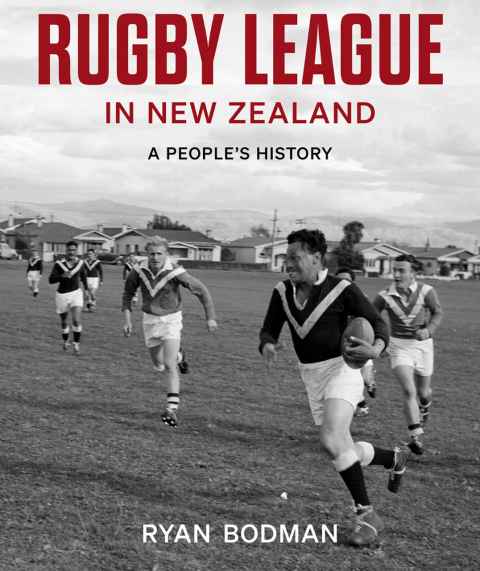Historian shows rugby league is more than a game
7 November 2023
Ryan Bodman’s book on the history of New Zealand rugby league also tells the story of this country’s post-war culture.

Ryan Bodman’s book Rugby League in New Zealand: A People’s History traces the journey of the 13-player game since its introduction to the country in 1907. Although league fans will enjoy it, maybe not quite as much as they would have enjoyed the Warriors making it to the NRL grand final, Ryan’s research into the sport’s wider cultural significance unearths intriguing insights into the nation’s past that will appeal to a greater audience.
Ryan, who works as a freelance historian, conceived this book after completing his MA in history at the University of Auckland in 2012.
“My thesis was a study of trade unions post-Second World War and it included oral histories from across Aotearoa,” he says.
“I was talking to these guys about their lives, and rugby league kept popping up.”
Rugby league originated in England after a split with rugby union because of player payments. Its popularity in New Zealand unfolds as a David versus Goliath struggle against rugby union. As an example, in 1911 when word reached the Nelson Rugby Union (NRU) that Stoke Industrial School wanted to offer league, the hazards of professionalism were held up as a concern. The NRU secretary wrote: “I would point out that no school, private or public – college or university – has embraced this professional game, recognising in it a grave danger to youth by encouraging a professional spirit in sport.”
This attitude informally permeated education policy, with a delegation of league representatives in 1922 addressing the Minister of Education to combat prejudice against the game.
The same year, the New Zealand Rugby Union demonstrated almost bullying behaviour to stop league’s rise, telling Māori, “The league game will pollute your minds.”
My thesis was a study of trade unions post-Second World War and it included oral histories from across Aotearoa. I was talking to these guys about their lives, and rugby league kept popping up.
Despite this, league flourished. At the University of Auckland in 1957, the late Bob Dragicevich helped establish the Auckland University Rugby League Club. Aucklander Bob had done a DipPhEd in Otago and set up the first NZ university league club there in 1953, then one at Canterbury in 1956.
In Ryan’s book, former NZRL president Gerald Ryan said having University of Auckland students play league was “almost heretical”. “It was unheard of for the University to play league.”
But it happened, although the University club did become defunct eventually, with league clubs amalgamating over time.
Ryan’s book has rebellious history at its heart, which aligns with his own activism.
“I’m very interested in power and that drives my study of history.”
He’d wanted his book to be academically credible but also publicly accessible, so he needed the views of regular people.
“My purpose is to encourage excitement and engagement with knowledge. I’d come across Dr Michael Stevens’ Facebook page, ‘A World History of Bluff’, that made me aware of the potential value of social media to promote public engagement with my research.”
Ryan created the ‘Rugby League: a New Zealand History’ Facebook page, which was also a good way to identify some of the people in photos he’d uncovered.
“I wanted to write in a similar way to how our grandad spoke to us as kids… as a storyteller, narrative driven, so that you read it and wonder what’s going to happen next.”
I wanted to write in a similar way to how our grandad spoke to us as kids ... as
a storyteller.
Ryan spoke with working-class communities, Māori, Pacific migrants – basically, people from all walks of life involved in league.
“So, while the book has a single story, it’s driven by all these little stories. I almost became spiritual in the process as, in a crazy way, the book almost wrote itself.”
Ryan is thinking about a PhD and has a personality trait that serves research well.
“I’m an obsessive person, which has plagued me, but as a researcher it’s fine. I don’t leave any stone unturned. I now think of it as a gift.”
He adds that he couldn’t have written this book without his time at the University.
“The postgraduate seminars with people like Dr Deborah Montgomerie and Professor Caroline Daley helped refine my thinking around national identity. All that groundwork was laid at the University.”
His likely doctoral topic is the alcohol industry in New Zealand. As he’s a stay-at-home dad of two, his research interest also looks to their future.
“Alcohol has a cultural power and the industry attaches itself to our identity as a nation. It makes money out of profound suffering in communities, so how is it a respectable element of our society?”
By Denise Montgomery

This article first appeared in Spring 2023 Ingenio.